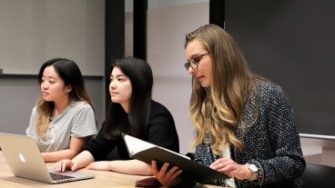
UNSW Science Vacation Research Scholarships (SVRS) 2025 - 2026
Applications open on 21 August 2025 and close on 19 September 2025.
Are you a science student who would like the opportunity to experience the real world of scientific research first-hand?
Put your summer holidays to good use with a six-week Summer Vacation Research Scholarship. You’ll gain valuable research experience working with our renowned supervisors to participate in a research project. If you’re a talented undergraduate science student enrolled in your second year or above, it’s an opportunity worth applying for.
Students currently enrolled in second-year or above of an undergraduate program in the Faculty of Science or a science-related discipline at UNSW or another Australian university are invited to apply for an SVRS to join a BABS research team and participate in research over the coming summer.
Each SVRS scholarship is valued at $3,800 and students will participate in a six-week research project.
The school facilitates collaborative research efforts across discipline boundaries for fundamental discoveries, generation of commercial opportunities and clinical research. BABS has key strengths in environmental microbiology, genetics and cellular biology, molecular medicine, and associated technology development in the areas of functional genomics and many facets of biotechnology. The school has a unique strength in combining fundamental biological and biomolecular sciences with strong applied biotechnology and medical focus.
Eligibility
To be eligible:
- You must be currently enrolled in second-year or above of an undergraduate program in the Faculty of Science or a science-related discipline at UNSW or another Australian or New Zealand University.
- You must be able to be engaged in a project on a full-time basis (35 hours/week for six weeks during normal working hours unless advised otherwise by the supervisor).
- Projects must focus on research-based activities (administration tasks are not regarded as research) and should be completed by the end of February.
- Each successful candidate can hold only ONE such scholarship at a time.
- Students who were previously awarded a UNSW Science Vacation Research Scholarship are not eligible to apply.
How to apply
The first step of the application process is to contact the supervisor of your chosen project to discuss the project's requirements (see below for BABS SVRS projects on offer). When you have decided on your project preferences, please submit the application forms by the closing date listed above.
Full details (including how to apply) are provided on the Scholarships website (enquiries can be directed to science.adrt@unsw.edu.au). Note: Students are required to submit 2 applications - a scholarship application and the UNSW Science Vacation Research Submission Form.
SVRS Projects 2025 - 2026
-
Supervisor: Prof John Mattick and Dr Mitchell Cummins
Email: j.mattick@unsw.edu.au
Description: Bioinformatic analysis of genomic and gene expression databases
Experience required: Familiarity with cell and devepmental biology; computational competence
-
Supervisor: Dr Laurence Luu
Email: laurence.luu@unsw.edu.au
Description: Bordetella pertussis is the bacteria that causes whooping cough, a severe respiratory disease in children. In recent years, strains have emerged with increased potential to evade vaccine-induced immunity and resistance to macrolides, the main antibiotic used for treatment. This project will conduct a systematic review of the literature to investigate the global prevalence of mutations associated with vaccine escape and antibiotic resistance.
-
Supervisor: A/Prof Vladimir Sytnyk
Email: v.sytnyk@unsw.edu.au
Description: Neurodegenerative disorders are characterised by dramatic changes in interactions between neurons. In this project, we will analyse how these changes contibute to the progression of neurodegenerative disorders at the cellular and molecular levels.
Experience required: Some experience in wet lab techniques would be beneficial
Roy and Lois Tirrell Award (UGCA1213)
Amount: $5,000
The purpose of the scholarship is to support UNSW students studying an undergraduate degree program within the School of Biotechnology and Biomolecular Science.
Eligibility
The recipient must be currently enrolled in any full-time undergraduate degree program within the UNSW School of Biotechnology and Biomolecular Science including, but not limited to, the following programs*:
- Bachelor of Science
- Bachelor of Science (International)
- Bachelor of Biotechnology (Honours)
- Bachelor of Advanced Science
*Enrolment in a dual degree is also permissible.
Selection
Applicants will be considered based on their UAC Equity Scholarship or UAC Educational Access Scheme application, or another appropriate UNSW admissions pathway program.
Scholarship Availability
One recipient will be awarded this Scholarship. The Scholarship will be reoffered once the current Scholarship holder ceases to receive benefits. The last open round for applications was in 2019. See 'How to apply' below to confirm if applications are open.
